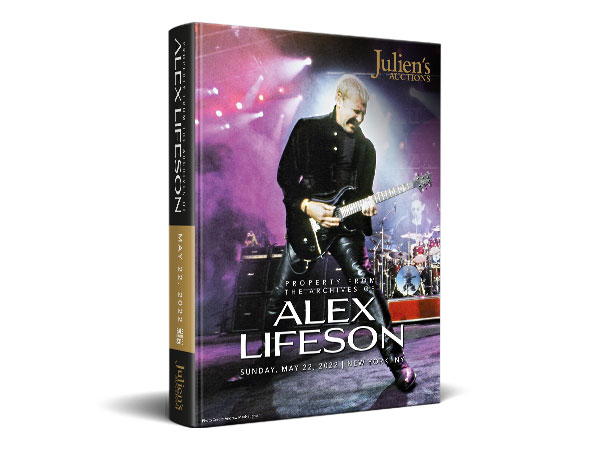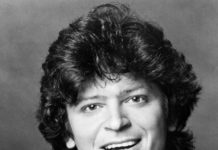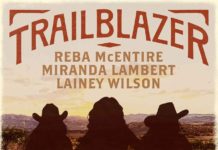Part of Julien’s “Music Icons” auction happening on May 20th, 21st and 22nd, “Property From The Archives of Alex Lifeson” will feature over 60 vintage guitars and other career memorabilia from the personal collection Alex Lifeson, the legendary Rock and Roll Hall of Fame guitarist and co-founder of Rush. One of the greatest rock groups of all time, selling more than 40 million records worldwide during the band’s four-decade history. You can check it out here.
Highlights from the collection include…
– A 1976 custom-built Gibson ES-355TD, aka “Whitey, played by Lifeson throughout most of his career with Rush. “Whitey” is featured on all albums from “A Farewell to Kings” to “Test for Echo,” and can be seen played by Lifeson on stage during all Rush tours from 1977 to 2015 as well as in many of the band’s music videos. This splendid guitar was part of Rush’s most explosive era of creativity. Alex Lifeson: “I purchased this guitar in 1976, it was custom-built in Kalamazoo just for me. It has been my main guitar and is the iconic Alex Lifeson guitar.”
– A 1970 Gibson Les Paul acquired by Lifeson during Rush’s inaugural tour and played extensively on all Rush albums and tours from “Fly By Night” and “2112” to “Hemispheres.”
– A 1971 Jose Ramirez acoustic guitar used by Lifeson to record all classical-style tracks on the album “Hemispheres,” including “The Trees” and “La Villa Strangiato.”
– A 1976 Gibson Dove acoustic guitar played on numerous tours and used by Lifeson to write “Closer to the Heart” and other songs from the 1977 Rush album “A Farewell to Kings.”
– A 1976 Gibson J-55 acoustic guitar used by Lifeson to compose Rush’s platinum-selling album “2112” as well as “A Farewell to Kings” and served as the main acoustic guitar on “Natural Science” and “Camera Eye” from “Permanent Waves” and “Moving Pictures.”
– A 1980 custom Hentor Sportscaster played by Lifeson on most Rush albums since “Moving Pictures,” and was the main guitar used on the recording of the album “Grace Under Pressure.” This guitar was favored by Lifeson as his primary instrument for soloing – in particular the solo for the band’s hit single “Limelight,” and can be seen in the music videos for “Vital Signs,” “Countdown,” and “Enemy Within.” The Sportscaster’s heavy yet versatile sound embodies Rush’s bold sonic explorations of the 1980s and Lifeson’s growth as a soloist during this time.
– A 1981 Gibson Howard Roberts fusion guitar that served as Lifeson’s main guitar during the “Moving Pictures” tour.
Additional items on offer will include concert and tour ephemera, passes, and photographs as well as original lyric sheets.
Born as Aleksandar Živojinovic, August 27th, 1953 in Fernie, British Columbia and raised in Toronto, Canada, Alex Lifeson received his first guitar for Christmas at the age of thirteen and never looked back, forging his own path towards rock and roll greatness. In the summer of 1968, Lifeson co-founded a band called The Projection with John Rutsey and Jeff Jomes who were later replaced by Geddy Lee and Neal Peart in 1974. With Lee on vocals, bass, and keyboards, Peart on drums, and Lifeson on guitar, the band would soon be known to the world as Rush.
After hitting the Toronto rock music scene and releasing their first single, a cover of Buddy Holly’s “Not Fade Away,” the band released their self-titled debut album which contained their first hit single “Working Man” featuring Lifeson’s guitar work – hailed by Guitar World as having one of the greatest guitar solos of all time. The popular fan favorite brought them to the U.S. and helped secure a recording contract from Mercury Records who released their next two albums, “Fly by Night” and “Caress of Steel.”
But it was in 1976 that the band would have their biggest breakthrough and worldwide recognition with the release of the album “2112,” considered Rush’s masterpiece, and a rock music landmark with a 20-minute title track divided into seven sections. The platinum selling album began Rush’s streak of sold-out arena tours in the U.S. and Canada and the phenomenon of its worldwide cult fan base. The group also released their first live album that same year, “All the World’s a Stage,” a two-disc LP recorded during a three-night stand at Massey Hall in Toronto.
The group’s next two albums, “A Farewell to Kings” and “Hemispheres” represent a further evolution in the direction of progressive rock and produced the hit single, “Closer to The Heart.”
Following the 1980 release of their top five charting album “Permanent Waves,” which featured the smash hit song “The Spirt of Radio,” Rush became one of the most successful bands in the world.
Their popularity soared to even greater heights with the release of 1981’s “Moving Pictures.” The blockbuster album featured their biggest and most revered classics, “Limelight,” “Red Barchetta,” “YYZ,” and “Tom Sawyer,” and became the band’s best-selling and most commercially successful album in the U.S. hitting number three on the Billboard Charts and selling four million copies.
Lifeson’s penchant for musical experimentation can be heard in the band’s 1982 album, Signals, featuring their U.S. Top 40 hit “New World Man” which included synthesizers and mixed elements of ska, reggae, and funk.
Rush transitioned back to the band’s classic rock sound of guitar, bass, and drums with Lifeson’s acclaimed work on the 1989 album Presto, 1993’s Counterparts featuring their Grammy nominated song “Leave That Thing Alone,” the 1996 album Test for Echo, and the 2002 album Vapor Trails – the first Rush album since the 1970s without keyboards and synthesizer where Lifeson used over 50 different guitars and was hailed by Guitar Player as “his most rabid and experimental playing ever.”
In 1996, Lifeson released his first solo project, Victor, named for the title track from the W. H. Auden poem, with both his son Adrian and wife Charlene also contributing to the album.
His dynamic body of work includes numerous instrumental contributions and guest appearances, such as the guitar solos of “Crying Over You” and “Holy Water” on Platinum Blonde’s 1985 album Alien Shores; Lawrence Gowan’s 1990 album Lost Brotherhood; guests tracks on Tom Cochrane’s 1995 album Ragged Ass Road, “Like a Girl” from I Mother Earth’s Scenery and Fish album; “The Little Drummer Boy” on the 1997 album Merry Axemas: A Guitar Christmas; “Anesthetize” on Porcupine Tree’s 2007 album Fear of a Blank Planet and “Sacred and Mundane” on the Tiles’ 2008 album Fly Paper.
In 2006, Lifeson founded the Big Dirty Band which provided the original soundtrack material for the popular Trailer Park Boys: The Movie, where he would later guest appear in the franchise’s later films as well as voice the character Big Chunk in the animated series.
Lifeson is also a composer and producer whose credits include the theme for the science-fiction TV series Andromedia; songs on the 3 Doors Down album Away from the Sun; Keram Malicki-Sanchez’s 2014 album Come to Life – playing guitar on the songs “Mary Magdalene”, “Moving Dark Circles” and “The Devil Knows Me Well,” and on Keram’s subsequent singles “Artificial Intelligence,” “That Light,” and “Rukh” as well as being featured on Marco Minneman’s 2017 release Borrego, Fu Manchu’s 2018 Clone of the Universe album and more.
Subsequent Rush recordings and tours include their 30th anniversary 2004 EP Feedback which featured their covers of Cream, The Who, and the Yardbirds’ songs; 2007’s Snakes & Arrows; the 2011 live album Time Machine 2011: Live in Cleveland; and 2012’s Clockwork Angels.
Rush ranks fifth for most consecutive gold or platinum studio albums, after the likes of The Beatles, The Rolling Stones, Kiss, and Aerosmith.
Lifeson’s awards and recognitions include induction into the Rock and Roll Hall of Fame in 2013; ranking third in the Guitar World Readers poll of 100 greatest guitarists, and listing on Rolling Stone’s 100 Greatest Guitarists of All Time; as well as being made an Officer of the Order of Canada on May 9, 1996, along with Rush bandmates Geddy Lee and Neil Peart, and receiving the Governor General’s Award in 2012–the highest artistic honor in Canada. Additionally, Lifeson is a painter, golfer, aircraft pilot and part-owner of The Orbit Room in Toronto, Canada.
In 2021, Lifeson released two new instrumental songs, “Kabul Blues” and “Spy House,” and recently made headlines with the news of his self-titled debut LP from new band Envy of None, featuring bassist Andy Curran, singer-songwriter Maiah Wynne, and producer Alfio Annibalini, to be released on April 18, featuring a song dedicated to late Rush band mate and drum legend Neil Peart.
If you can’t make it out to Beverly Hills to bid in person, you can still watch all the action as well as bid online at Julien’s Live.







